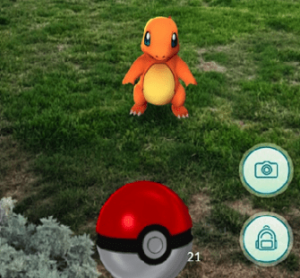 The unintended consequences of design: Pokémon GO not only has health benefits, but it’s the first one that makes augmented reality (AR) seem not just fun but, well, normal. It has been a near-overnight sensation. No surprise there. Clever design and use of AR satisfy core psychological needs while challenging negative beliefs about video games.
The unintended consequences of design: Pokémon GO not only has health benefits, but it’s the first one that makes augmented reality (AR) seem not just fun but, well, normal. It has been a near-overnight sensation. No surprise there. Clever design and use of AR satisfy core psychological needs while challenging negative beliefs about video games.
Pokémon GO, the latest release in Nintendo’s Pokémon franchise, is a mobile app that uses augmented reality (AR) and GPS to extend the fantasy world of Pokémon into a player’s physical space. While many people may be excited that the world of Pokémon has been emancipated from consoles and Gameboys in favor of the near-ubiquitous smartphone, few reckoned that it would get a many people as active and connected as it has.
The game revolves around finding and collecting Pokémon characters while you are on the go. In fact, it requires that you get out of your house and move around to even play. It also, like most things, is more fun when you play with others. The app has nearly as many active daily users as Twitter—more than the servers can handle in my area. Its popularity has also added billions to Nintendo’s stock price and it hasn’t even launched globally yet.
In case you’ve been living in a pop-culture-free zone, Nintendo released the first Pokémon games (short for pocket monsters) back in 1996. The goal of the game is to catch, train and trade 151 cute, Manga-style creatures in order to become a Pokémon Master. Pokémon has grown into a massive franchise with upwards of 700 Pokémon characters, films, card, console and Gameboy games, a SuperBowl ads and, with Pokémon GO, an augmented reality mobile app.
Why is Pokémon Go such a big success?
- The Pokémon app is a very user-friendly introduction into AR, mobile games and Pokémon. It’s simple but satisfying.
- Pokémon GO was released to a massive, built-in fanbase coupled with its near society-wide awareness.

- Mobile phones are everywhere but AR is relatively new. People will find it easy to experiment with AR using Pokémon GO, especially compared to an unfamiliar or more complex game experience. The net effect should make AR producers smile. It lowers the adoption hurdle, making AR not just palatable but ‘normal.’
- Twenty years of Pokémon history means that Pokémon is now a multigenerational experience. Like Star Wars, there is a collective history that people of all ages can play and share.
- From a self-determination theory perspective, human motivation can be broken down into three main areas: social connection,agency and mastery. While VR is the shiny penny of the moment, it is also socially isolating and physically challenging for the large percentage of the population that have some degree of motion sensitivity. AR is the opposite.
- AR is empowering because it lets you extend fantasy into your physical world.
- Pokémon GO encourages you to connect with others but provides a ‘safety zone’ by doing so in a game context.
- Games by definition are structured to reward actions (agency) and Pokémon keeps track of all your captured Pokémon in a register that tracks your progress toward becoming a Pokémon Master (mastery).
- Game knowledge and experience provide social capital in a setting where social connection revolves around the game.
- By requiring players to move around outside and connect socially, it contradicts two major biases against games and makes playing Pokémon GO more acceptable to non-gamers and parents.
- In evolutionary psychology terms, it includes several elements, such as reward and social validation, that trigger approach instincts in ways that may overshadow any avoidance responses driven by anxiety, shyness, or other reticence, especially in places where many are playing — such as college campuses or meet-ups.
What’s good about Pokémon GO?
There’s a lot to like about the concept of Pokémon GO, even if you don’t want to play.
- Pokémon GO does more than just get players to move. Using the GPS feature, the game integrates local environments, monuments and places of significance into the gameplay, requiring people to learn about their local environments.
- Because people are seeking local Pokespots as part of the game, they can actually meet in person. Pokémon GO, therefore, acts as a preference filter—you can be sure that the people you meet in pursuit of Pokémon will at least share some of your interests.
- It’s no secret that social contact and physical activity are known to increase positive mood, decrease anxiety and depression, and improve immune systems. Also, people who go outside are exposed to sunlight and receive the benefits of Vitamin D. Not to mention feeling better about yourself.
- Pokémon GO has the potential for positive impact beyond the initial gameplay activity. As work by Barbara Fredrickson and many others have demonstrated, positive emotions have a cumulative effect over time, increasing things like optimism,resilience, self-esteem and social confidence.
- Pokémon GO can be integrated with other apps and devices, like Fitbit and Runkeeper, to add another layer of activity, such as keeping track of fitness goals, movement or routes. Because all of these fitness apps have team-building and social sharing capabilities, they would allow players to connect with non-players and support different goals while still having fun with Pokémon GO.
- Pokémon GO will enable easier adoption of other AR apps that have benefits beyond entertainment value, from tourism apps that translate signs and take you on city tours to educational applications that give new meaning to “self-directed” learning.
What’s the downside of Pokemon GO?
I kind of hate to go here, since games generally get more than their share of bashing. However, there are a few things to consider.
- People have selective attention when they hyper-focus. There is concern about players not paying attention to their surroundings in pursuit of their Pokémon captures. We see the same phenomena with multitasking while moving whether it’s calling, texting, Snapchatting, sightseeing and even book reading. The game starts with a warning that you have to acknowledge (twice) to address this.
- Pokémon GO has all kinds of elements that make it an enticing new way to procrastinate. Just like the selective attention issue, this isn’t the fault of the game. However, new games and apps often serve as reminders that self-regulation is a critical skill in the age of mobile devices.
- Pokémon GO, like much social technology, has the potential to be hacked by others, so it requires using some common sense before you go charging into dark alleys alone.
- For all the benefits, we will also have to get a lot smarter about the ethical and privacy risks of tools that collect, store and share our personal data and physical location. Just like with stepping off a curb, we can’t rely on companies to ‘protect’ us. Our incentives are not always aligned with those of companies. People also differ in their willingness to endure public exposure and in their ability to bear risk. We have to take the responsibility for getting informed and understanding the trade-offs and implications.
A version of this article appeared on Psychology Today in Positively Media.

 Dr. Pamela Rutledge is available to reporters for comments on the psychological and social impact of media and technology on individuals, society, organizations and brands.
Dr. Pamela Rutledge is available to reporters for comments on the psychological and social impact of media and technology on individuals, society, organizations and brands.